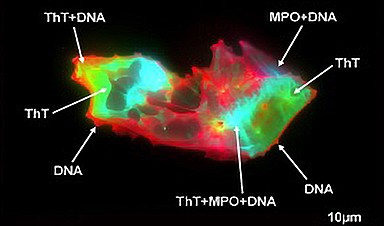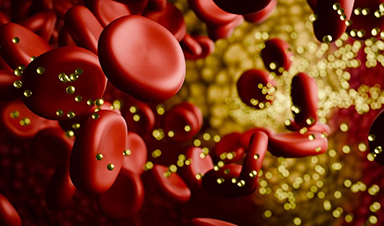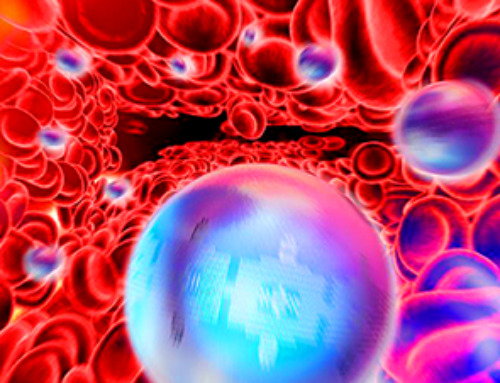A new study led by Massachusetts General Hospital (MGH) investigators finds that radiation therapy may increase the uptake of therapeutic nanoparticles by glioblastomas, raising the possibility of using both growth-factor-targeted and immune-system-based therapies against the deadly brain tumor. The team describes how pretreatment with low-dose radiation increased delivery to tumors of nanoparticles carrying small interfering RNA (siRNA) molecules and significantly improved survival in a mouse model of glioblastoma.
“We found that radiation therapy primes brain tumors for enhanced uptake of nanotherapeutics, allowing us to develop a targeted nanoparticle to deliver siRNAs for both immune checkpoint and targeted therapy against the most aggressive type of brain tumor,” says Bakhos Tannous, PhD, of the Neuro-Oncology Division in the MGH Department of Neurology, senior author of the report published in ACS Nano. “A brief burst of radiation was able to increase uptake of the nanoparticle up to five-fold, enhancing the effects of targeted therapy, activating the immune response at the tumor site and prolonging survival.”
While up to 60 percent of glioblastomas express the EGFR growth factor, a molecule used in targeted therapies against several types of cancer, EGFR-targeted therapies have had little success against the brain tumors. Similarly immunotherapies directed against immune checkpoints such as CTLA-4 and PD-L1 have promising results against many cancers but not yet against glioblastoma. Some studies have suggested an association between EGFR activation and increased PD-L1 expression, raising the possibility that targeted both could increase the antitumor effects.
In order to deliver siRNAs targeting both EGFR and PD-L1 to brain tumors, the researchers developed a solid lipid nanoparticle guided by a tumor-targeting peptide called iRGD, which binds to a molecule present on blood vessels lining the tumor, allowing it to penetrate both the blood-brain and blood-tumor barriers. Factors such as the small size and positive charge of this nanoparticle allow it to penetrate the blood-brain barrier; and like other solid lipid nanoparticles, its low cost, stability, biodegradability and ease of manufacture make it an attractive option, explains Gulsah Erel-Akba, PhD, of MGH Neuro-Oncology and Izmir Katip Celebi University in Turkey, the first author of the study.
Image Credit: massgeneral.org
News This Week
Fever-Proof Bird Flu Variant Could Fuel the Next Pandemic
Bird flu viruses present a significant risk to humans because they can continue replicating at temperatures higher than a typical fever. Fever is one of the body’s main tools for slowing or stopping viral [...]
What could the future of nanoscience look like?
Society has a lot to thank for nanoscience. From improved health monitoring to reducing the size of electronics, scientists’ ability to delve deeper and better understand chemistry at the nanoscale has opened up numerous [...]
Scientists Melt Cancer’s Hidden “Power Hubs” and Stop Tumor Growth
Researchers discovered that in a rare kidney cancer, RNA builds droplet-like hubs that act as growth control centers inside tumor cells. By engineering a molecular switch to dissolve these hubs, they were able to halt cancer [...]
Platelet-inspired nanoparticles could improve treatment of inflammatory diseases
Scientists have developed platelet-inspired nanoparticles that deliver anti-inflammatory drugs directly to brain-computer interface implants, doubling their effectiveness. Scientists have found a way to improve the performance of brain-computer interface (BCI) electrodes by delivering anti-inflammatory drugs directly [...]
After 150 years, a new chapter in cancer therapy is finally beginning
For decades, researchers have been looking for ways to destroy cancer cells in a targeted manner without further weakening the body. But for many patients whose immune system is severely impaired by chemotherapy or radiation, [...]
Older chemical libraries show promise for fighting resistant strains of COVID-19 virus
SARS‑CoV‑2, the virus that causes COVID-19, continues to mutate, with some newer strains becoming less responsive to current antiviral treatments like Paxlovid. Now, University of California San Diego scientists and an international team of [...]
Lower doses of immunotherapy for skin cancer give better results, study suggests
According to a new study, lower doses of approved immunotherapy for malignant melanoma can give better results against tumors, while reducing side effects. This is reported by researchers at Karolinska Institutet in the Journal of the National [...]
Researchers highlight five pathways through which microplastics can harm the brain
Microplastics could be fueling neurodegenerative diseases like Alzheimer's and Parkinson's, with a new study highlighting five ways microplastics can trigger inflammation and damage in the brain. More than 57 million people live with dementia, [...]
Tiny Metal Nanodots Obliterate Cancer Cells While Largely Sparing Healthy Tissue
Scientists have developed tiny metal-oxide particles that push cancer cells past their stress limits while sparing healthy tissue. An international team led by RMIT University has developed tiny particles called nanodots, crafted from a metallic compound, [...]
Gold Nanoclusters Could Supercharge Quantum Computers
Researchers found that gold “super atoms” can behave like the atoms in top-tier quantum systems—only far easier to scale. These tiny clusters can be customized at the molecular level, offering a powerful, tunable foundation [...]
A single shot of HPV vaccine may be enough to fight cervical cancer, study finds
WASHINGTON -- A single HPV vaccination appears just as effective as two doses at preventing the viral infection that causes cervical cancer, researchers reported Wednesday. HPV, or human papillomavirus, is very common and spread [...]
New technique overcomes technological barrier in 3D brain imaging
Scientists at the Swiss Light Source SLS have succeeded in mapping a piece of brain tissue in 3D at unprecedented resolution using X-rays, non-destructively. The breakthrough overcomes a long-standing technological barrier that had limited [...]
Scientists Uncover Hidden Blood Pattern in Long COVID
Researchers found persistent microclot and NET structures in Long COVID blood that may explain long-lasting symptoms. Researchers examining Long COVID have identified a structural connection between circulating microclots and neutrophil extracellular traps (NETs). The [...]
This Cellular Trick Helps Cancer Spread, but Could Also Stop It
Groups of normal cbiells can sense far into their surroundings, helping explain cancer cell migration. Understanding this ability could lead to new ways to limit tumor spread. The tale of the princess and the [...]
New mRNA therapy targets drug-resistant pneumonia
Bacteria that multiply on surfaces are a major headache in health care when they gain a foothold on, for example, implants or in catheters. Researchers at Chalmers University of Technology in Sweden have found [...]
Current Heart Health Guidelines Are Failing To Catch a Deadly Genetic Killer
New research reveals that standard screening misses most people with a common inherited cholesterol disorder. A Mayo Clinic study reports that current genetic screening guidelines overlook most people who have familial hypercholesterolemia, an inherited disorder that [...]






















Leave A Comment